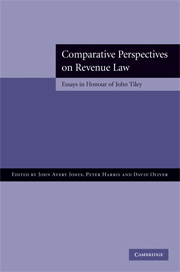Book contents
- Frontmatter
- Contents
- Contributors and affiliations
- Foreword by Dave Hartnett
- Foreword by Hugh Ault
- 1 A comparison of statutory general anti-avoidance rules and judicial general anti-avoidance doctrines as a means of controlling tax avoidance: Which is better? (What would John Tiley think?)
- 2 The judicial approach to avoidance: some reflections on BMBF and SPI
- 3 Comparing the application of judicial interpretative doctrines to revenue statutes on opposite sides of the pond
- 4 Abuse of rights and European tax law
- 5 The US legislative and regulatory approach to tax avoidance
- 6 The law of taxation and unjust enrichment
- 7 The history of royalties in tax treaties 1921–61: Why?
- 8 Land taxation, economy and society in Britain and its colonies
- 9 Meade and inheritance tax
- 10 Taxation, human rights and the family
- 11 Family connections and the corporate entity: income splitting through the family company
- Epilogue: Establishing the foundations of tax law in UK universities
- References
- Table of cases
- Table of abbreviations
- Index
6 - The law of taxation and unjust enrichment
Published online by Cambridge University Press: 07 December 2009
- Frontmatter
- Contents
- Contributors and affiliations
- Foreword by Dave Hartnett
- Foreword by Hugh Ault
- 1 A comparison of statutory general anti-avoidance rules and judicial general anti-avoidance doctrines as a means of controlling tax avoidance: Which is better? (What would John Tiley think?)
- 2 The judicial approach to avoidance: some reflections on BMBF and SPI
- 3 Comparing the application of judicial interpretative doctrines to revenue statutes on opposite sides of the pond
- 4 Abuse of rights and European tax law
- 5 The US legislative and regulatory approach to tax avoidance
- 6 The law of taxation and unjust enrichment
- 7 The history of royalties in tax treaties 1921–61: Why?
- 8 Land taxation, economy and society in Britain and its colonies
- 9 Meade and inheritance tax
- 10 Taxation, human rights and the family
- 11 Family connections and the corporate entity: income splitting through the family company
- Epilogue: Establishing the foundations of tax law in UK universities
- References
- Table of cases
- Table of abbreviations
- Index
Summary
Introduction
My first piece of academic research on being appointed to a Lectureship in Taxation at Cambridge, where I taught with John Tiley, concerned the extent to which the law of taxation could be supplemented by the common law of unjust enrichment. This was prompted by the decision of the House of Lords in Woolwich Equitable Building Society v IRC, which recognised a common law right to restitution of taxes. Over the subsequent fifteen years, the law of unjust enrichment has developed dramatically, and one of the main contexts for that development has concerned the recovery of taxes which were not due to the Revenue. This has recently reached its highpoint in the context of the extensive litigation arising from the decision of the ECJ that part of the UK tax legislation was discriminatory and consequently the national court had to provide remedies for those taxpayers who had paid taxes which were unlawfully paid to the Revenue. Now is an opportune time to review this litigation and to reassess the modern interrelationship between the law of unjust enrichment and the law of taxation.
At the heart of any claim for the restitution of taxes is the fundamental proposition that the state can only demand the payment of tax where it is lawfully authorised to do so. The Revenue can be considered to have received tax unlawfully for a variety of different reasons.
- Type
- Chapter
- Information
- Comparative Perspectives on Revenue LawEssays in Honour of John Tiley, pp. 132 - 165Publisher: Cambridge University PressPrint publication year: 2008

